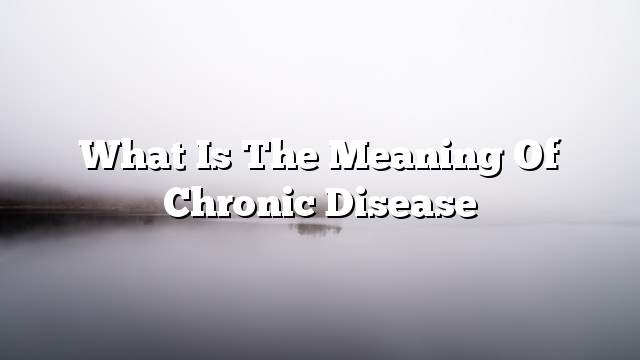Our body consists of many members and organs that work in harmony and balance and cooperate to perform their functions in order to have a healthy and healthy life. There are changes in the human body affecting these organs and organs, either because of unhealthy habits and behavioral habits or as a result of old age and other different causes. And the person is exposed to many diseases, including what is curable and goes to the disappearance of the effect, and unfortunately, what is incurable, causing permanent imbalance in the functions of the body affected by the disease and if not controlled, it may lead to the death of the injured person.
Chronic disease, also known as chronic disease, is what we mean here. Chronic disease is a disease that can not be cured and lasts with man throughout his life. It lasts for long periods with the human being and progresses and develops slowly in most cases. It is true that chronic or incurable disease can not be cured, but it can be controlled by following up with the doctor and taking the prescribed treatment for the patient regularly and to make changes in lifestyle and with the help of parents and friends and their cooperation with the patient. What happens is that the body of the patient with a malady disrupts the functions of its members affected by the disease, the body can not be able to follow the performance of its functions naturally and therefore requires external help and is to take the appropriate medication for the situation and condition, and must be away from the causes and triggers of chronic disease This makes changes in daily life. Examples of chronic diseases include heart disease such as stress, arteriosclerosis, stroke, diabetes, cancer endotracheal, acute respiratory disease, renal failure and other diseases.
It is useful to know that most chronic diseases can be largely preventable. For example, keeping away from alcoholic beverages contributes to the prevention of heart and liver diseases. Those who drink too much suffer from so-called liver cirrhosis, which is a serious disease. For the body and the most important purification of the body of toxins Any food or any substance enters the stomach goes to the liver to be filtered and remove harmful substances and toxic and then return to the blood. Quitting smoking also protects against heart disease, respiratory diseases and cancers. Remember that when you smoke, you do not only harm yourself but also those around you. Eating healthy, low-fat foods helps prevent atherosclerosis (the body needs fats but in small amounts to perform some vital functions like absorbing some essential vitamins). It is also necessary to take medicines properly and for their specific purpose, so be sure to ask your pharmacist and doctor about the appropriate medication for your condition and the dose you need.
